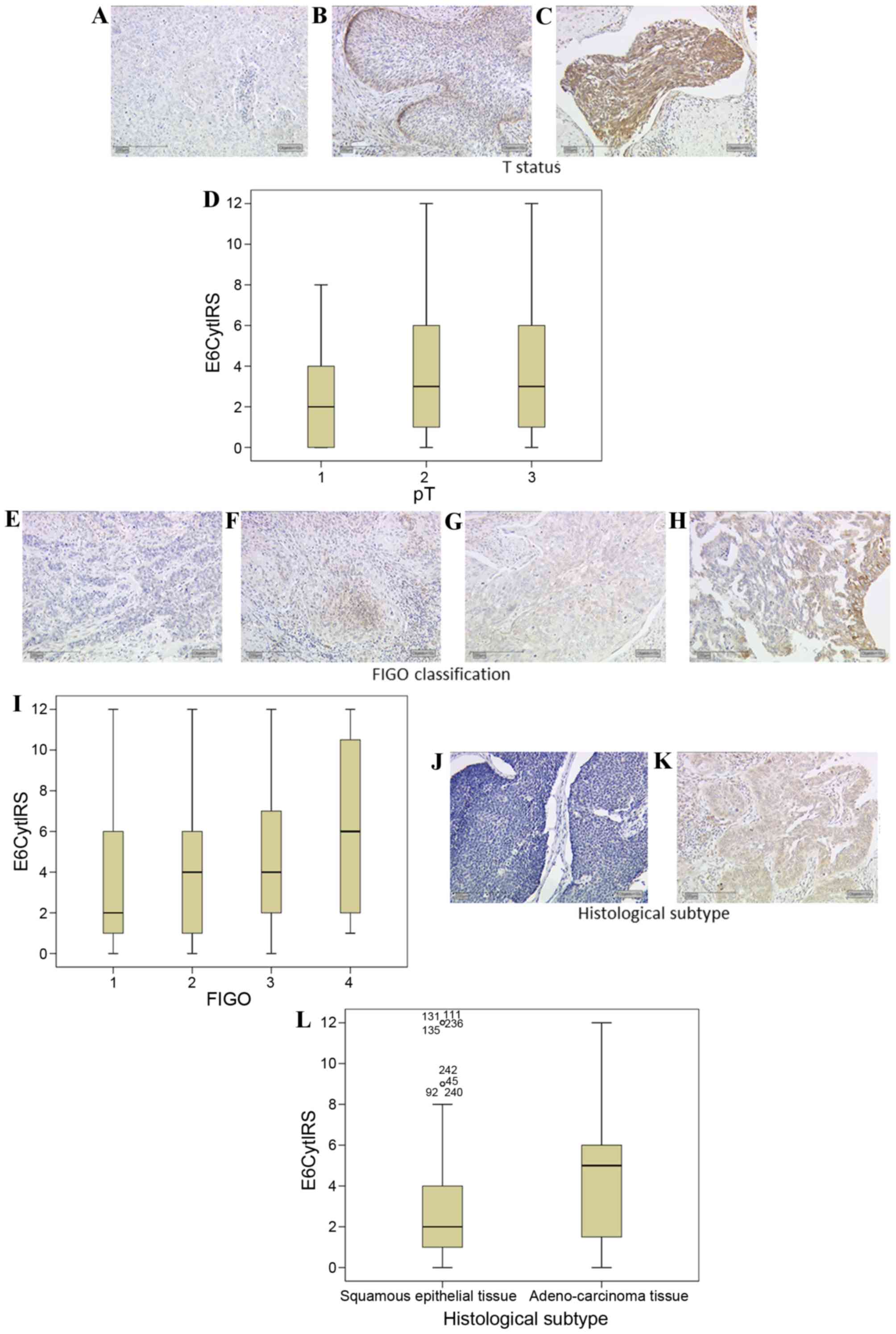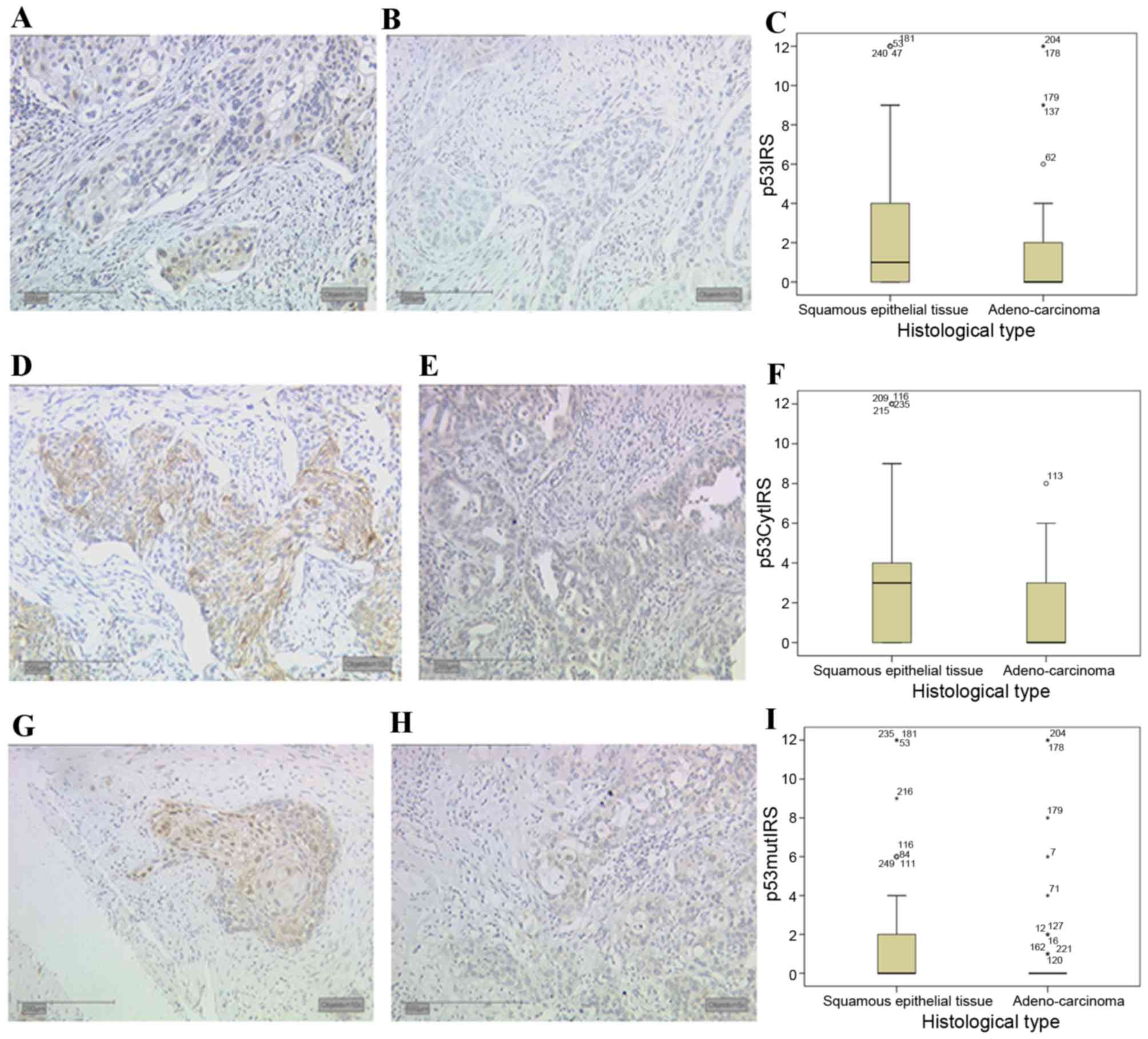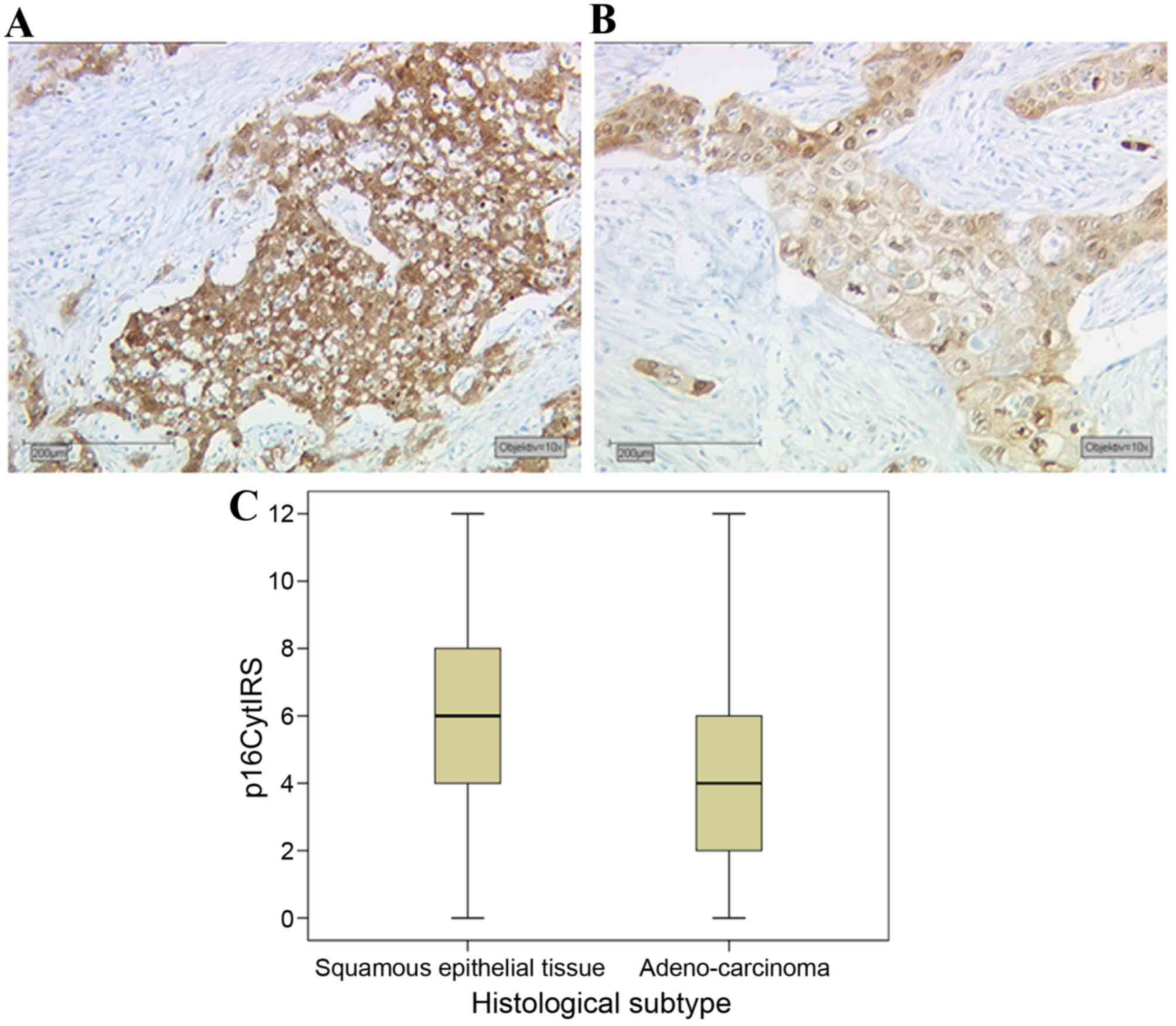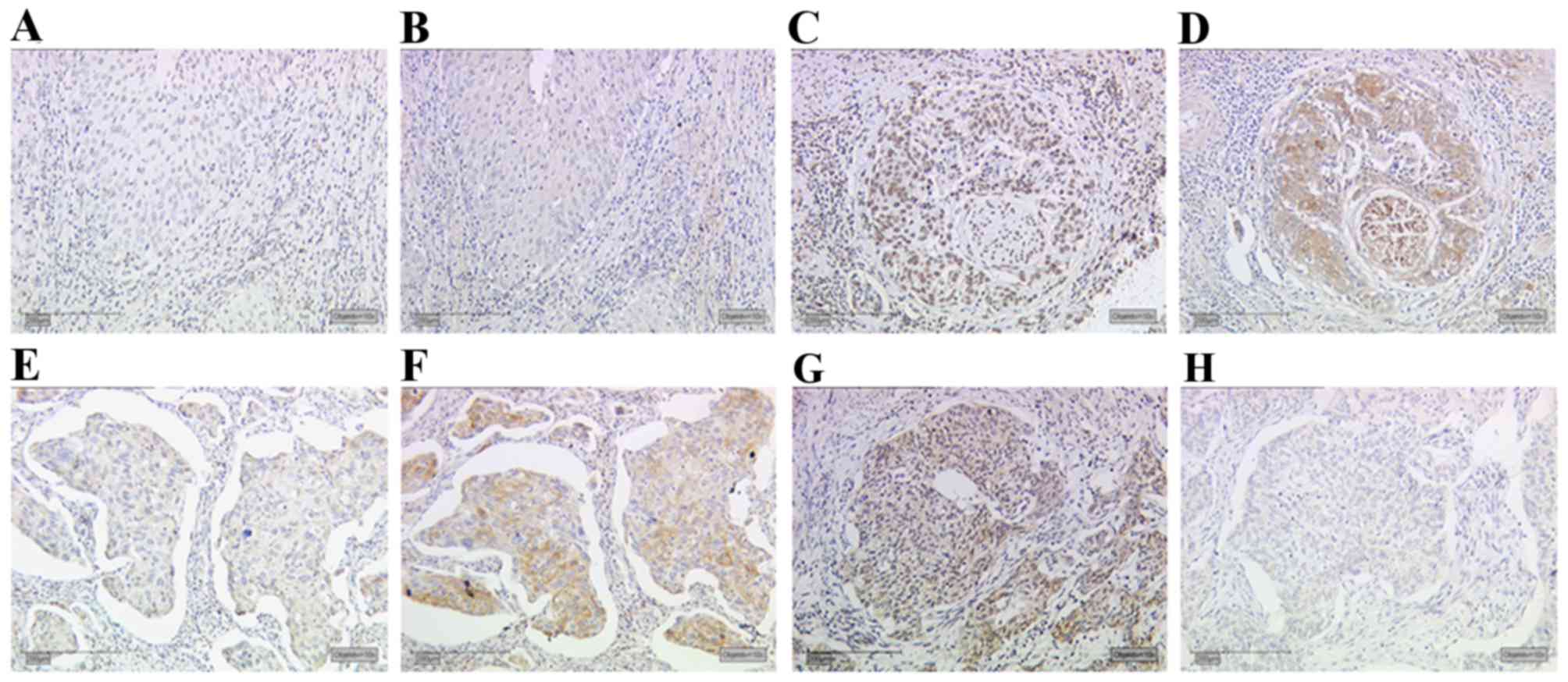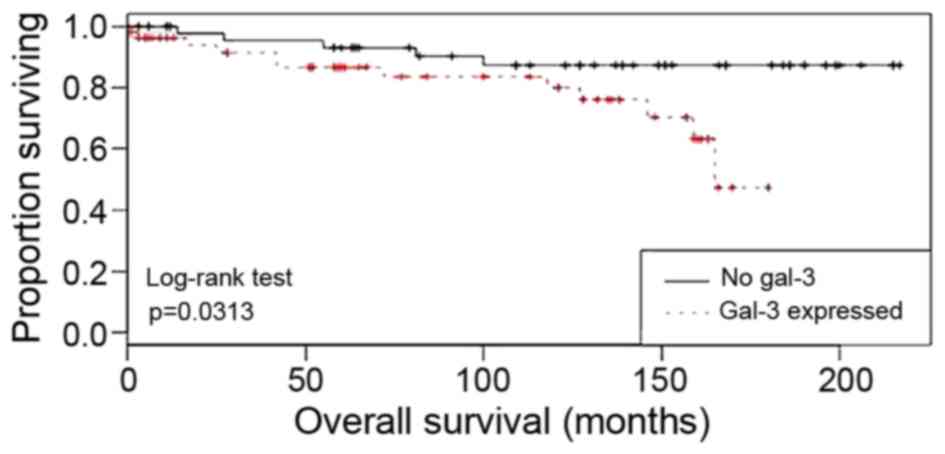|
1
|
Munoz N, Bosch FX, Castellsagué X, Díaz M,
de Sanjose S, Hammouda D, Shah KV and Meijer CJ: Against which
human papillomavirus types shall we vaccinate and screen? The
international perspective. Int J Cancer. 111:278–285. 2004.
View Article : Google Scholar : PubMed/NCBI
|
|
2
|
Schiffman M, Castle PE, Jeronimo J,
Rodriguez AC and Wacholder S: Human papillomavirus and cervical
cancer. Lancet. 370:890–907. 2007. View Article : Google Scholar : PubMed/NCBI
|
|
3
|
Wittekindt C, Wagner S, Mayer CS and
Klussmann JP: Basics of tumor development and importance of human
papilloma virus (HPV) for head and neck cancer.
Laryngorhinootologie. 91 (Suppl 1):S1–S26. 2012.(In German).
PubMed/NCBI
|
|
4
|
Muñoz N, Bosch FX, de Sanjosé S, Herrero
R, Castellsagué X, Shah KV, Snijders PJ and Meijer CJ:
International Agency for Research on Cancer Multicenter Cervical
Cancer Study Group: Epidemiologic classification of human
papillomavirus types associated with cervical cancer. N Engl J Med.
348:518–527. 2003. View Article : Google Scholar : PubMed/NCBI
|
|
5
|
Zengel P, Assmann G, Mollenhauer M, Jung
A, Sotlar K, Kirchner T and Ihrler S: Cancer of unknown primary
originating from oropharyngeal carcinomas are strongly correlated
to HPV positivity. Virchows Archiv. 461:283–290. 2012. View Article : Google Scholar : PubMed/NCBI
|
|
6
|
Gupta S, Takhar PP, Degenkolbe R, Koh CH,
Zimmermann H, Yang CM, Sim Guan K, Hsu SI and Bernard HU: The human
papillomavirus type 11 and 16 E6 proteins modulate the cell-cycle
regulator and transcription cofactor TRIP-Br1. Virology.
317:155–164. 2003. View Article : Google Scholar : PubMed/NCBI
|
|
7
|
Scheffner M, Huibregtse JM, Vierstra RD
and Howley PM: The HPV-16 E6 and E6-AP complex functions as a
ubiquitin-protein ligase in the ubiquitination of p53. Cell.
75:495–505. 1993. View Article : Google Scholar : PubMed/NCBI
|
|
8
|
Tang D, Wu D, Hirao A, Lahti JM, Liu L,
Mazza B, Kidd VJ, Mak TW and Ingram AJ: ERK activation mediates
cell cycle arrest and apoptosis after DNA damage independently of
p53. J Biol Chem. 277:12710–12717. 2002. View Article : Google Scholar : PubMed/NCBI
|
|
9
|
Mao C, Balasubramanian A, Yu M, Kiviat N,
Ridder R, Reichert A, Herkert M, von Knebel Doeberitz M and Koutsky
LA: Evaluation of a new p16(INK4A) ELISA test and a high-risk HPV
DNA test for cervical cancer screening: Results from
proof-of-concept study. Int J Cancer. 120:2435–2438. 2007.
View Article : Google Scholar : PubMed/NCBI
|
|
10
|
Melkane AE, Mirghani H, Aupérin A,
Saulnier P, Lacroix L, Vielh P, Casiraghi O, Griscelli F and Temam
S: HPV-related oropharyngeal squamous cell carcinomas: A comparison
between three diagnostic approaches. Am J Otolaryngol. 35:25–32.
2014. View Article : Google Scholar : PubMed/NCBI
|
|
11
|
Assmann G and Sotlar K: HPV-associated
squamous cell carcinogenesis. Pathologe. 32:391–398. 2011.(In
German). View Article : Google Scholar : PubMed/NCBI
|
|
12
|
Adams AK, Wise-Draper TM and Wells SI:
Human papillomavirus induced transformation in cervical and head
and neck cancers. Cancers (Basel). 6:1793–1820. 2014. View Article : Google Scholar : PubMed/NCBI
|
|
13
|
Barondes SH, Castronovo V, Cooper DN,
Cummings RD, Drickamer K, Feizi T, Gitt MA, Hirabayashi J, Hughes
C, Kasai K, et al: Galectins: A family of animal
beta-galactoside-binding lectins. Cell. 76:597–598. 1994.
View Article : Google Scholar : PubMed/NCBI
|
|
14
|
Hirabayashi J and Kasai KI: Evolution of
animal lectins. Prog Mol Subcell Biol. 19:45–88. 1998. View Article : Google Scholar : PubMed/NCBI
|
|
15
|
Barondes SH, Cooper DN, Gitt MA and
Leffler H: Galectins. Structure and function of a large family of
animal lectins. J Biol Chem. 269:20807–20810. 1994.PubMed/NCBI
|
|
16
|
Kasai K and Hirabayashi J: Galectins: A
family of animal lectins that decipher glycocodes. J Biochem.
119:1–8. 1996. View Article : Google Scholar : PubMed/NCBI
|
|
17
|
Hirabayashi J, Hashidate T, Arata Y, Nishi
N, Nakamura T, Hirashima M, Urashima T, Oka T, Futai M, Muller WE,
et al: Oligosaccharide specificity of galectins: A search by
frontal affinity chromatography. Biochim Biophys Acta.
1572:232–254. 2002. View Article : Google Scholar : PubMed/NCBI
|
|
18
|
Boonlikit S and Srisantiroj N: Is there
any clinical advantage in separating CIN 2 from CIN 3 in the
current two-tiered cytological classification? Asian Pac J Cancer
Prev. 10:115–118. 2009.PubMed/NCBI
|
|
19
|
Remmele W, Hildebrand U, Hienz HA, Klein
PJ, Vierbuchen M, Behnken LJ, Heicke B and Scheidt E: Comparative
histological, histochemical, immunohistochemical and biochemical
studies on oestrogen receptors, lectin receptors, and Barr bodies
in human breast cancer. Virchows Arch A Pathol Anat Histopathol.
409:127–147. 1986. View Article : Google Scholar : PubMed/NCBI
|
|
20
|
Mylonas I, Speer R, Makovitzky J, Richter
DU, Briese V, Jeschke U and Friese K: Immunohistochemical analysis
of steroid receptors and glycodelin A (PP14) in isolated glandular
epithelial cells of normal human endometrium. Histochem Cell Biol.
114:405–411. 2000.PubMed/NCBI
|
|
21
|
Mylonas I, Makovitzky J, Richter DU,
Jeschke U, Briese V and Friese K: Cathepsin D expression in normal,
hyperplastic and malignant endometrial tissue: An
immunohistochemical analysis. Acta Histochem. 105:245–252. 2003.
View Article : Google Scholar : PubMed/NCBI
|
|
22
|
Kraljevic Z, Visković K, Ledinsky M,
Zadravec D, Grbavac I, Bilandzija M, Soljacić-Vranes H, Kuna K,
Klasnić K and Krolo I: Primary uterine cervical cancer: Correlation
of preoperative magnetic resonance imaging and clinical staging
(FIGO) with histopathology findings. Coll Antropol. 37:561–568.
2013.PubMed/NCBI
|
|
23
|
Ozsarlak O, Tjalma W, Schepens E,
Corthouts B, de Beeck Op B, Van Marck E, Parizel PM and De Schepper
AM: The correlation of preoperative CT, MR imaging, and clinical
staging (FIGO) with histopathology findings in primary cervical
carcinoma. Eur Radiol. 13:2338–2345. 2003. View Article : Google Scholar : PubMed/NCBI
|
|
24
|
Horn LC, Schierle K, Schmidt D, Ulrich U,
Liebmann A and Wittekind C: Current TNM/FIGO classification for
cervical and endometrial cancer as well as malignant mixed
mullerian tumors. Facts and background. Pathologe. 32:239–243.
2011.(In German). View Article : Google Scholar : PubMed/NCBI
|
|
25
|
Freier CP, Stiasny A, Kuhn C, Mayr D,
Alexiou C, Janko C, Wiest I, Jeschke U and Kost B:
Immunohistochemical evaluation of the role of p53 mutation in
cervical cancer: Ser-20 p53-Mutant correlates with better
prognosis. Anticancer Res. 36:3131–3137. 2016.PubMed/NCBI
|
|
26
|
zur Hausen H: Papillomaviruses causing
cancer: Evasion from host-cell control in early events in
carcinogenesis. J Natl Cancer Inst. 92:690–698. 2000. View Article : Google Scholar : PubMed/NCBI
|
|
27
|
Hafner N, Gajda M, Altgassen C, Hertel H,
Greinke C, Hillemanns P, Schneider A and Dürst M: HPV16-E6 mRNA is
superior to cytokeratin 19 mRNA as a molecular marker for the
detection of disseminated tumour cells in sentinel lymph nodes of
patients with cervical cancer by quantitative reverse-transcription
PCR. Int J Cancer. 120:1842–1846. 2007. View Article : Google Scholar : PubMed/NCBI
|
|
28
|
Hoffmann M, Tribius S, Quabius ES, Henry
H, Pfannenschmidt S, Burkhardt C, Görögh T, Halec G, Hoffmann AS,
Kahn T, et al HPV DNA: E6*I-mRNA expression and p16INK4A
immunohistochemistry in head and neck cancer-how valid is p16INK4A
as surrogate marker? Cancer Lett. 323:88–96. 2012. View Article : Google Scholar : PubMed/NCBI
|
|
29
|
Nigro JM, Baker SJ, Preisinger AC, Jessup
JM, Hostetter R, Cleary K, Bigner SH, Davidson N, Baylin S, Devilee
P, et al: Mutations in the p53 gene occur in diverse human tumour
types. Nature. 342:705–708. 1989. View Article : Google Scholar : PubMed/NCBI
|
|
30
|
Petitjean A, Achatz MI, Borresen-Dale AL,
Hainaut P and Olivier M: TP53 mutations in human cancers:
Functional selection and impact on cancer prognosis and outcomes.
Oncogene. 26:2157–2165. 2007. View Article : Google Scholar : PubMed/NCBI
|
|
31
|
Vogelstein B, Lane D and Levine AJ:
Surfing the p53 network. Nature. 408:307–310. 2000. View Article : Google Scholar : PubMed/NCBI
|
|
32
|
Hainaut P and Hollstein M: p53 and human
cancer: The first ten thousand mutations. Adv Cancer Res.
77:81–137. 2000. View Article : Google Scholar : PubMed/NCBI
|
|
33
|
Klug SJ, Ressing M, Koenig J, Abba MC,
Agorastos T, Brenna SM, Ciotti M, Das BR, Del Mistro A, Dybikowska
A, et al: TP53 codon 72 polymorphism and cervical cancer: A pooled
analysis of individual data from 49 studies. Lancet Oncol.
10:772–784. 2009. View Article : Google Scholar : PubMed/NCBI
|
|
34
|
Sonoyama T, Sakai A, Mita Y, Yasuda Y,
Kawamoto H, Yagi T, Yoshioka M, Mimura T, Nakachi K, Ouchida M, et
al: TP53 codon 72 polymorphism is associated with pancreatic cancer
risk in males, smokers and drinkers. Mol Med Rep. 4:489–495.
2011.PubMed/NCBI
|
|
35
|
Alawadi S, Ghabreau L, Alsaleh M,
Abdulaziz Z, Rafeek M, Akil N and Alkhalaf M: P53 gene
polymorphisms and breast cancer risk in Arab women. Med Oncol.
28:709–715. 2011. View Article : Google Scholar : PubMed/NCBI
|
|
36
|
Petitjean A, Mathe E, Kato S, Ishioka C,
Tavtigian SV, Hainaut P and Olivier M: Impact of mutant p53
functional properties on TP53 mutation patterns and tumor
phenotype: Lessons from recent developments in the IARC TP53
database. Hum Mutat. 28:622–629. 2007. View Article : Google Scholar : PubMed/NCBI
|
|
37
|
Bode AM and Dong Z: Post-translational
modification of p53 in tumorigenesis. Nat Rev Cancer. 4:793–805.
2004. View Article : Google Scholar : PubMed/NCBI
|
|
38
|
Chehab NH, Malikzay A, Stavridi ES and
Halazonetis TD: Phosphorylation of Ser-20 mediates stabilization of
human p53 in response to DNA damage. Proc Natl Acad Sci USA.
96:13777–13782. 1999. View Article : Google Scholar : PubMed/NCBI
|
|
39
|
Wade M, Wong ET, Tang M, Stommel JM and
Wahl GM: Hdmx modulates the outcome of p53 activation in human
tumor cells. J Biol Chem. 281:33036–33044. 2006. View Article : Google Scholar : PubMed/NCBI
|
|
40
|
Kim HJ, Do IG, Jeon HK, Cho YJ, Park YA,
Choi JJ, Sung CO, Lee YY, Choi CH, Kim TJ, et al: Galectin 1
expression is associated with tumor invasion and metastasis in
stage IB to IIA cervical cancer. Hum Pathol. 44:62–68. 2013.
View Article : Google Scholar : PubMed/NCBI
|
|
41
|
Huang EY, Chen YF, Chen YM, Lin IH, Wang
CC, Su WH, Chuang PC and Yang KD: A novel radioresistant mechanism
of galectin-1 mediated by H-Ras-dependent pathways in cervical
cancer cells. Cell Death Dis. 3:e2512012. View Article : Google Scholar : PubMed/NCBI
|
|
42
|
Matsui Y, Ueda S, Watanabe J, Kuwabara I,
Ogawa O and Nishiyama H: Sensitizing effect of galectin-7 in
urothelial cancer to cisplatin through the accumulation of
intracellular reactive oxygen species. Cancer Res. 67:1212–1220.
2007. View Article : Google Scholar : PubMed/NCBI
|
|
43
|
Tsai CJ, Sulman EP, Eifel PJ, Jhingran A,
Allen PK, Deavers MT and Klopp AH: Galectin-7 levels predict
radiation response in squamous cell carcinoma of the cervix.
Gynecol Oncol. 131:645–649. 2013. View Article : Google Scholar : PubMed/NCBI
|
|
44
|
Liang MY, Lu YM, Zhang Y and Zhang SL:
Serum galectin-9 in cervical cancer. Zhonghua Yi Xue Za Zhi.
88:2783–2785. 2008.(In Chinese). PubMed/NCBI
|
















